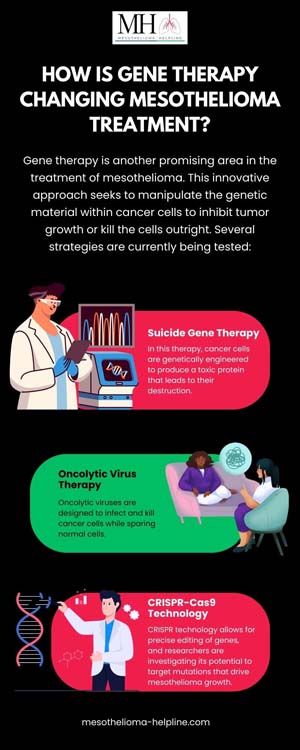Mesothelioma is a rare and aggressive form of cancer that primarily affects the lining of the lungs (pleura), abdomen (peritoneum), or heart (pericardium). This disease is caused primarily by exposure to asbestos, a mineral once commonly used in construction and manufacturing. Given its severity and resistance to standard treatments, the medical community continuously seeks new therapies to improve patient outcomes and quality of life. This article will explore new treatments for mesothelioma and provide insights into emerging therapies, clinical trials, and innovative strategies.
Table of Contents
- What is Mesothelioma and How is it Treated?
- Are There Any New Treatments for Mesothelioma?
- What is Immunotherapy for Mesothelioma?
- How is Gene Therapy Changing Mesothelioma Treatment?
- What Role Does Tumor Treating Fields (TTFields) Play in Mesothelioma Treatment?
- What Other Experimental Mesothelioma Treatments Exist?
- What Are the Challenges and Future Directions in Mesothelioma Treatment?
- Conclusion
- FAQ
What is Mesothelioma and How is it Treated?
Mesothelioma is a rare type of cancer that affects approximately 3,000 people annually in the United States. It develops after prolonged exposure to asbestos, with symptoms typically taking 20 to 50 years to manifest. The most common forms of mesothelioma include:
- Pleural Mesothelioma (lungs)
- Peritoneal Mesothelioma (abdomen)
- Pericardial Mesothelioma (heart)
Traditional treatments include surgery, radiation therapy, and chemotherapy. However, due to the aggressive nature of this disease, these methods often only extend life expectancy by a few months or years. As a result, patients and doctors alike are interested in new treatments for mesothelioma to improve survival rates and enhance quality of life.
Are There Any New Treatments for Mesothelioma?
Yes, there are several promising new treatments for mesothelioma. The rapidly evolving field of cancer research has introduced therapies that target mesothelioma more effectively than conventional treatments. These novel approaches include:
- Immunotherapy
- Gene Therapy
- Tumor Treating Fields (TTFields)
- Targeted Therapy
- Photodynamic Therapy
Each of these options offers a unique approach to treating mesothelioma by leveraging the latest scientific advancements.
What is Immunotherapy for Mesothelioma?
Immunotherapy has emerged as one of the most groundbreaking new treatments for mesothelioma. This therapy stimulates the body's immune system to recognize and attack cancer cells more effectively. Several immunotherapy options are now being explored in clinical trials for mesothelioma, including:
- Checkpoint Inhibitors: Checkpoint inhibitors, such as nivolumab and pembrolizumab, block proteins that prevent immune cells from attacking cancer cells. These drugs have shown promise in improving mesothelioma patients' survival.
- CAR T-Cell Therapy: CAR T-cell therapy involves genetically modifying a patient's T-cells (a type of immune cell) to recognize and destroy mesothelioma cells. While still in early trials, this therapy holds significant potential for treating hard-to-treat cancers like mesothelioma.
- Monoclonal Antibodies: Monoclonal antibodies are engineered to target specific proteins on mesothelioma cells. One example is bevacizumab, which blocks the growth of new blood vessels that tumors need to grow.
Benefits of Immunotherapy:
- Can target cancer cells more precisely.
- Fewer side effects than traditional chemotherapy.
- Potential for longer-term cancer remission.
How is Gene Therapy Changing Mesothelioma Treatment?
Gene therapy is another promising area in the treatment of mesothelioma. This innovative approach seeks to manipulate the genetic material within cancer cells to inhibit tumor growth or kill the cells outright. Several strategies are currently being tested:
- Suicide Gene Therapy: In this therapy, cancer cells are genetically engineered to produce a toxic protein that leads to their destruction.
- Oncolytic Virus Therapy: Oncolytic viruses are designed to infect and kill cancer cells while sparing normal cells.
- CRISPR-Cas9 Technology: CRISPR technology allows for precise editing of genes, and researchers are investigating its potential to target mutations that drive mesothelioma growth.
Advantages of Gene Therapy:
- Can offer highly targeted treatments for mesothelioma.
- Potential for lasting results with fewer side effects than traditional treatments.
- May work in tandem with immunotherapy for enhanced efficacy.
What Role Does Tumor Treating Fields (TTFields) Play in Mesothelioma Treatment?
Tumor Treating Fields (TTFields) is a relatively new technology that uses electrical fields to disrupt cancer cell division. It is gaining recognition as an innovative new treatment for mesothelioma, particularly for patients who cannot undergo surgery.
How Does TTFields Work?
TTFields uses low-intensity, alternating electric fields to target rapidly dividing cells. Since cancer cells divide at a faster rate than normal cells, they are particularly vulnerable to these electric fields. The electric currents interfere with the cancer cells' internal structures, leading to cell death.
Benefits of TTFields in Mesothelioma:
- Non-invasive and can be used in conjunction with other therapies.
- Has minimal side effects compared to chemotherapy and radiation.
- May significantly slow tumor growth and extend survival rates in patients with mesothelioma.
What Other Experimental Mesothelioma Treatments Exist?
In addition to immunotherapy, gene therapy, and TTFields, several other experimental therapies are being tested to determine their effectiveness against mesothelioma.
- Targeted Therapy: Drugs that specifically target molecular changes driving cancer growth, such as EGFR and VEGF inhibitors.
- Photodynamic Therapy (PDT): Uses light-activated drugs to destroy cancer cells.
- Cryotherapy: Uses extreme cold to destroy cancer cells.
- Vaccine Therapy: Stimulates the immune system to attack cancer cells by targeting specific proteins found on mesothelioma cells.
What Are the Challenges and Future Directions in Mesothelioma Treatment?
While significant strides have been made in developing new treatments for mesothelioma, several challenges remain:
- Early Diagnosis: Mesothelioma is often diagnosed at an advanced stage, limiting treatment options.
- Treatment Resistance: Mesothelioma can develop resistance to treatments, making it crucial to continue research into combination therapies and new drugs.
- Accessibility of Treatments: Some cutting-edge treatments are still in clinical trials and not widely available.
- High Costs of New Treatments: Making advanced therapies more affordable is essential as they transition to broader use.
Conclusion
Mesothelioma remains a challenging disease to treat, but there are several new treatments for mesothelioma that show great promise. Immunotherapy, gene therapy, TTFields, and other experimental treatments represent a new frontier in mesothelioma care. While there are still many challenges to overcome, these emerging therapies offer hope for improved survival rates and better quality of life for mesothelioma patients.
As research continues to evolve, it is critical for patients to stay informed about new treatment options and clinical trials that may offer more effective solutions.
FAQs
- What is the most promising new treatment for mesothelioma?
Immunotherapy, particularly with checkpoint inhibitors like nivolumab and pembrolizumab, is currently one of the most promising new treatments for mesothelioma. - Can gene therapy cure mesothelioma?
Gene therapy is still in the experimental stage, but it holds significant potential for offering targeted treatment. - Are new treatments for mesothelioma available to all patients?
Some new treatments, such as CAR T-cell therapy, are still in clinical trials, but others, like immunotherapy, are becoming more accessible. - What is the survival rate for mesothelioma with new treatments?
Survival rates vary, but new treatments like immunotherapy and TTFields have shown the potential to extend life by months or even years. - Is there financial assistance available for new mesothelioma treatments?
Yes, financial assistance and clinical trials can help offset costs. Patients should consult their healthcare provider for options.



